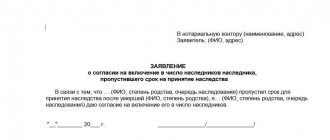People often wonder: is it possible to revoke a will for an apartment, and in what cases? This can be done only on the grounds specified by law.
There are two types of revocation of a will. The first is the loss of legal force due to the actions of the property owner. The owner can cancel and change his decision on the disposal of property after death an unlimited number of times.
The second is when a document is declared invalid in court at the request of an interested party.
Is it possible to cancel or change a will?
Russian legislation enshrines the principle of freedom of will - Art. 1119 of the Civil Code of the Russian Federation.
It is realized not only through the right of the testator to dispose of property at his own discretion by drawing up a declaration of will. Another manifestation of the principle of freedom is the right of a citizen to cancel or change a previously drawn up document.
Cancellation or change of will occurs in accordance with Art. 1130 Civil Code of the Russian Federation. To exercise such a right, the testator does not require the consent of any of his relatives, heirs or third parties. The property owner also does not have to explain the reasons that prompted him to change or cancel his decision.
The legislation does not limit the testator in the number of statements of will drawn up - Art. 1119 of the Civil Code of the Russian Federation. After his death, the notary will be guided by the latest version of the document. In this case, previous wills will remain in force to the extent that they do not contradict the newly drawn one.
Reasons for revoking a will
The reasons for canceling or changing the act of expression of will can be different - their objectivity and significance are determined solely by the testator. Moreover, the testator has the right to keep secret from others the circumstances that prompted him to revoke his notarized orders.
A will is revoked by a notary on the basis of an application by its author to cancel individual orders, the document as a whole, or the drawing up of a new act that fully or partially contradicts the previous one.
Example . In the first will, the testator left his apartment to his daughter, but a few years after that she died. After this, her father came to the notary in order to revoke the document. To do this, he drew up a new will, in which he indicated his granddaughter instead of his deceased daughter.
Example . After drawing up the expression of will, the citizen changed his mind about one of the persons appointed by him and wished to exclude him from the list of successors. To do this, he submitted an application to the notary to cancel all orders concerning the unworthy, in his opinion, heir.
For what reasons is a document cancelled?
The initiators of the annulment of the will may be:
- Testator.
- Heirs or other citizens who have the right to an obligatory share - only after the death of the owner.
Possible reasons for the testator to cancel his orders regarding property may be:
- Death of one of the candidates.
- Breaking relations with a successor means a quarrel, irreconcilable differences.
- Change of shares or composition of property.
The heirs can annul the will of the deceased only in cases where the norms of the law were violated during its preparation or approval. For example, the testator was incapacitated at the time of signing the document. Or the rights of obligatory heirs were not taken into account.
The testator has the right to deprive one or more heirs of property by:
- There is a special instruction about this in the will. For example, “I am disinheriting my son I.V. Petrov.”
- Distribution of property in such a way that the successor gets nothing.
See also:
How to disinherit an heir by law - step-by-step instructions
Who has the right to an obligatory share in the inheritance regardless of the will in 2021
Cancellation time and place
The testator has the right to cancel notarized orders at any time, up to his death, provided he has full legal capacity. In some cases, a certificate confirming this circumstance may even be required.
The place where a will is revoked is not regulated by law, nor is the place where it was drawn up. They may not even coincide - data on notarial actions in relation to all expressions of the citizen’s will are recorded in the Unified Information System, which eliminates the possibility of misunderstandings.
But the testator should also remember about the convenience of his successors, who will have to look for the will and redirect it to the notary working at the place of last registration of the deceased to open an inheritance case.
How to cancel a document during the life of the testator
You can cancel an inheritance document during your lifetime in one of the following ways:
- By making a new will.
- Having issued an order to cancel the previous document.
Below is a detailed algorithm for the testator’s actions to implement each of the options.
Step 1
Compose the text of the document
How to make a new will
The declaration of will must be drawn up taking into account the mandatory requirements for the form and procedure for certification - Art. 1118 Civil Code of the Russian Federation, art. 1124 Civil Code of the Russian Federation. In case of failure to comply with such requirements, the will may be declared invalid - clause 1 of Art. 1124 Civil Code of the Russian Federation.
When composing a new document, you can cancel a previously compiled one by:
- Direct cancellation.
- Indirect cancellation.
In the first case, the owner of the property can indicate in the text that with the new will:
- Cancels what was previously compiled.
- Cancels certain provisions of the previous expression of will.
In the second case you can:
- Include in the document completely different orders regarding the distribution of the inheritance without a direct indication of cancellation - then the conclusion about the complete cancellation of the previous expression of will can be reached as a result of comparing the contents of the documents.
- Include other instructions only regarding the distribution of a certain part of the inheritance. The previous will is considered canceled in the part in which it contradicts the newly drawn one - clause 2 of Art. 1130 Civil Code of the Russian Federation.
In the latter situation, both documents remain in force, but the earlier one will be applied only to the extent that does not contradict the newly drawn one.
A new expression of will can also simply complement the previous one. Then the previous orders regarding the property will continue to be in full force. The exception is those provisions that differ from the newly drawn up document.
Sample will
Sample will (DOC, 16 KV)
See also:
How to make a will in 2021 - a detailed guide with step-by-step instructions
How to draw up an order to cancel a document
The order applies only to cases where the last will of the property owner has been revoked. It is drawn up in the same form as a will. Accordingly, the procedure for registration and certification will be identical.
The text of the order must reflect:
- Name - order to revoke a will.
- Place and date of its compilation.
- A will that is revoked.
- Certifying inscription of a notary.
Sample order to cancel a will
Sample order to cancel a will (DOC, 16 KV)
Who can help compose the text of the document?
To obtain advice on canceling or amending a will, you can contact an experienced lawyer.
The testator has the right to independently draw up a new declaration of will or order for cancellation. It is necessary to take into account that failure to comply with the form and procedure for certifying the document entails the risk of it being challenged by the heirs. And as a result, the will of the testator is recognized as invalid.
When canceling a previous will in whole or in part, as well as when drawing up an order to cancel the expression of will, the accuracy of the wording and completeness of the information provided about the property and who it will go to is important. In the absence of such data, the implementation of the true will of the testator will become impossible.
For example, in the new declaration of will, the owner forgot to indicate that the apartment he owns will be inherited not by his son, as in the previous document, but by his grandson. Therefore, his new wish will not be fulfilled.
A citizen can draw up a text from a notary by paying the state fee and the cost of his legal and technical services.
The best option is to use the services of a lawyer.
Lawyer Sergey Ershov will provide advice on the day of application, assist in changing the will, drawing up the text of a new declaration of will or an order to cancel a previously drawn up document, and suggest what wording to use to correctly reflect the will of the testator.
On the page you can familiarize yourself with the work schedule, find out the office address and contact numbers.
Step 2
Prepare the necessary documents. These include:
- Identification.
- Documents for property - their presence is not mandatory, but for reliability you can provide them.
- Evidence of the testator’s full legal capacity will help protect the citizen from having his will declared invalid due to the testator’s incapacity. But the notary will still check your legal capacity even without such documents.
- Previous Will - If the testator wishes to consult with a notary about what language is best to use to properly reflect the new will.
My article How to draw up a will in 2021 - a detailed guide with step-by-step instructions contains a detailed list of information that a notary needs to certify the will of the testator and is relevant for changing/cancelling the last will.
Step 3
Pay the state fee and notarize the expression of will.
What is the state duty?
There is no fee for issuing a cancellation order. But based on the application of the rules for certifying a will, the state duty will be 100 rubles. (as well as certification of a new document) - Art. 333.24 Tax Code of the Russian Federation.
In addition to the state fee, the testator must pay the cost of notary services of a legal and technical nature (drafting the text of the document, printing, copying, etc.). On average you will have to pay from 500 to 2 thousand rubles.
Their size is established annually by the Federal Notary Chamber for each region. You can get acquainted with the types of services and tariffs for the subject of the Russian Federation you are interested in on the FNP website.
What actions does a notary take when certifying a document?
The certification of the will or the order for revocation occurs according to the rules provided for the certification of a will. Notary:
- Verifies the legal capacity of the testator.
- Checks the compliance of the text of the document with the true will of the citizen.
- Involve witnesses when their participation is necessary. For example, when certifying a closed will or at the request of the property owner.
After completing the procedure, the notary gives one copy of the document to the testator, and keeps the other for himself.
Which notary should I contact to change/cancel my last will?
Notarization of a citizen's expression of will is a prerequisite for its legality. To do this, you must contact a notary, with the exception of cases of execution of a will in accordance with Art. 1127 of the Civil Code of the Russian Federation.
The owner of property is often concerned about the question of whether it is possible to revoke a will with another notary. The legislation does not oblige a citizen to contact exactly the notary who certified the original document - Art. 40 Fundamentals of the legislation of the Russian Federation on notaries.
If another notary was brought in to draw up a new expression of will or an order to cancel, it is advisable for the testator to inform the person who certified the citizen’s will earlier about this by:
- Sending a notification about the cancellation or change of the last will - indicating the data of the involved notary or the person entrusted by law with performing his function.
- Sending a copy of the newly drawn up document or cancellation order.
Important! Notification of the notary, who previously certified the testator's will, about the newly drawn up document is a kind of guarantee that the inheritance will be carried out in accordance with the new will of the citizen.
If a will is canceled or changed by the same notary, a mark to this effect is placed on the copy of the will kept by him. The specified information is also entered into the register of registration of notarial acts - Art. 58 Basics about notaries.
Documentation
When making and revoking a will, the testator is required to submit a similar package of papers, which consists of only two documents - an identity card and a receipt for payment of state fees.
There is an opinion that the notary must present title documents for the apartment, a certificate of legal capacity, etc. But in fact, it is not entirely legal to demand them from the testator. This can be argued as follows:
- The law does not prohibit bequeathing property that did not belong to the testator at the time of certification of posthumous dispositions (the main thing is that the apartment should be registered by the day the inheritance is opened).
- The regulatory legal acts of the Russian Federation do not indicate that the testator is obliged to provide a certificate of sanity, and the notary has the right to demand it (Article 43 of the “Fundamentals of the Legislation of the Russian Federation on Notaries” states that the notary is obliged to check the legal capacity of persons who apply to him, but the method of this verification is not installs). However, you should not refuse to submit documentary evidence of your own legal capacity - this certificate will only strengthen the legal force of the application and strengthen the legal position of the testator.
Suitable identification documents:
- passport of a citizen of the Russian Federation or another state;
- passport of a military man, sailor;
- military ID;
- resident card;
- temporary residence permit, etc.
How to change a will
This cannot be done by simply making changes to a previously certified document. Only a newly drawn up declaration of will, which will reflect the citizen’s changed instructions regarding the distribution of his property, can change the provisions of the previous one.
The procedure of the testator corresponds to the above algorithm provided for the cancellation of the last will.
It is also possible to change a will for an apartment certified by a notary only by drawing up a new document.
The only requirement concerns the form in which it is drawn up. In emergency circumstances, a will, as well as a testamentary disposition of rights to funds, cannot change a document for an apartment drawn up by a notary - clauses 5, 6 of Art. 1130 Civil Code of the Russian Federation.
Consequences
The consequences of revocation of a will may be:
- A change in the inheritance order, as a result of which the heirs by law will be called upon to receive the apartment.
- Loss of the ability of some heirs under a will to claim living space or to receive a testamentary refusal at its expense.
- Transfer of ownership to a new designated successor.
- Exclusion from the will of sub-designated claimants.
Which will can be canceled or changed
The testator can cancel or change the will drawn up in any form. But there are some peculiarities.
How to revoke or change a will in emergency circumstances
By an expression of will made in emergency circumstances, only the same will can be canceled or changed - clause 5 of Art. 1130 Civil Code of the Russian Federation.
This means that the owner of the property, in conditions of a threat to his life, cannot, for example, change the last will certified by a notary.
Written form and the participation of 2 witnesses are required. If the citizen remains alive, then within a month from the date the emergency circumstances cease, he must contact a notary to certify his orders regarding the property. Otherwise, it loses legal force.
Successors wishing to receive an inheritance under such a document will have to go to court to confirm the emergency of the situation - Art. 1129 of the Civil Code of the Russian Federation.
How to cancel a testamentary disposition in a bank
Similar to the above example, a testamentary disposition (hereinafter referred to as the GR) in a bank can only be canceled or changed by the GR with rights to funds in the same bank - clause 6 of Art. 1130 Civil Code of the Russian Federation.
Procedure - clause 12 of PPRF No. 351:
- Contact the bank where the initial PO was drawn up.
- Present an identification document and inform the bank employee about your last will.
- Attaching a new ZR to the previous document.
A newly drawn up declaration of will, certified by a notary, can cancel or change the RA. This condition is relevant provided that the will contains instructions regarding the distribution of funds held in the relevant bank.
For example, the use in the text of a new expression of will of the wording “I bequeath all my property” indicates the abolition of any ZR with rights to funds in any bank. And the phrase “I bequeath deposit No. 12345” cancels the previous order only in relation to this deposit.
To cancel the RA in the bank, the testator has the right to issue an appropriate cancellation order - clauses 4, 6 of Art. 1130 Civil Code of the Russian Federation. In this case, one copy of the newly drawn up document must be sent to the bank - clause 12 of PPRF No. 351.
Is it possible to revoke a joint will of spouses?
As for the joint expression of the will of the spouses, it can be canceled by the husband or wife both during the life and after the death of the second spouse - clause 4 of Art. 1118 of the Civil Code of the Russian Federation. This legal norm also establishes the right of any of the spouses to make a subsequent will, incl. closed.
A previously completed joint will can be canceled by an inheritance agreement if spouses are also parties to it - Part 3, Clause 5, Art. 1140.1 Civil Code of the Russian Federation.
Is it possible to cancel or change an inheritance agreement?
An inheritance agreement can be changed or terminated only during the lifetime of the parties to the transaction - Art. 1140.1 Civil Code of the Russian Federation:
- By agreement of the parties to the contract.
- By court decision - only in connection with a significant change in circumstances. The legislator includes the possibility of calling compulsory heirs to inherit in such circumstances.
In relation to an inheritance agreement, the testator has the right to unilaterally refuse the transaction. It is implemented by notifying all parties to the contract of such refusal. The notice must be notarized.
A subsequent will can cancel or change the inheritance agreement - clause 12 of Art. 1140.1 Civil Code of the Russian Federation.
Registration of donation
Some testators, in order to avoid the risk of the will being declared invalid and in order to speed up the process of transferring the apartment to the successor, opt for the execution of a deed of gift. Unlike a will, it cannot be canceled, it is much more difficult to challenge, and the moment of transfer of the object occurs almost immediately after the act of donation is completed.
For these reasons, the owners of property already bequeathed by a notarized deed apply for its cancellation and begin to draw up a deed of gift.
You cannot donate an apartment that has not been privatized or is planned for purchase. To conclude a transaction, the donor will need to confirm ownership of the object of donation using title documents and an extract from the Unified State Register of Real Estate.
The donation procedure is carried out as follows:
- Preparation of documents (donor's passport, adult passport or birth certificate of a minor recipient, deeds of title to the apartment, receipt of payment of state duty, extract from the house register, report of the estimated value of the living space, deed of gift in triplicate).
- Payment of the state fee for state registration (200 rubles).
- Visit to the Rosreestr office or multifunctional center.
- Concluding an agreement and registering the transfer of ownership of the apartment.
Close relatives (parents, spouse, children, brothers, sisters, grandparents) are exempt from paying tax on the gift received. The remaining recipients will have to pay the state 13% of the appraised value of the apartment.
Cancellation of a will, like its drafting, requires extreme precision in compliance with the rules established for this and clarity in the formulation of its orders. This will ensure the document has legal force and will deprive those who disagree with its contents of the opportunity to challenge the act in court. In order not to risk the well-being of his heirs and to ensure that the instructions made during his lifetime are implemented, the testator is recommended to seek the help of lawyers from the website ros-nasledstvo.ru. They will contact you within 5 minutes and answer the question asked through the form below for free.
FREE CONSULTATIONS are available for you! If you want to solve exactly your problem, then
:
- describe your situation to a lawyer in an online chat;
- write a question in the form below;
- call Moscow and Moscow region
- call St. Petersburg and region
Save or share the link on social networks
(
2 ratings, average: 3.00 out of 5)
- FREE for a lawyer!
Write your question, our lawyer will prepare an answer for FREE and call you back in 5 minutes.
By submitting data you agree to the Consent to PD processing, PD Processing Policy and User Agreement
Useful information on the topic
4
How to restore the missed deadline for accepting an inheritance
The law limits the period allotted for accepting an inheritance to 6 months from...
99
How to enter into an inheritance after death without a will according to law
A will is an act of unilateral expression of the will of the testator, allowing one to determine the future fate...
9
How to enter into an inheritance after the death of a husband
The rules and procedure for entering into inheritance are regulated by the third part of the Civil...
12
How to prove and confirm relationship with the deceased
The presence of family ties is the main condition for a calling to inheritance...
21
Inheritance of a privatized apartment after the death of the owner by law and will
After privatization, the apartment used on the basis of a social tenancy agreement passes...
93
How much does it cost to enter into an inheritance from a notary in 2021?
The amount of expenses for entering into an inheritance after death depends on...
What are the consequences of canceling or changing the expression of will?
When a new will or order for revocation is drawn up properly in compliance with the norms of civil law, then the canceled or amended provisions of previous expressions of will cannot be restored - clause 2 of Art. 1130 Civil Code of the Russian Federation.
A newly drawn up document or an order for cancellation may be declared invalid if there are grounds provided for by law (incapacity of the testator, made through a representative). Inheritance in such circumstances will be carried out in accordance with earlier versions of the deceased's last will.
When the testator canceled the previous expression of will, and then the subsequent one, the rules of inheritance by law will apply. Because the original document cannot be restored after the will that was revoked is revoked.
See also:
How the inheritance is divided between heirs according to the law in 2021
How to enter into an inheritance legally in 2021 - step-by-step instructions
Deadline for filing a claim
It is best for the heir to file a claim in court to have the will declared invalid within a period not exceeding 6 months from the date of the testator’s death. However, if for good reasons it was not possible to do this, for example, the heir did not know about the right violated by the will, then the law establishes the following deadlines:
- within 3 years from the date of receipt of information about the existence of a will, if the will is canceled due to improper form or content of the document, as well as the recognition of the drafter as incompetent;
- within 1 year due to evidence of threats and pressure on the originator.
Thus, both the maker himself and the heirs after his death can revoke a will. There are many reasons why a will may be invalidated. Each of them has specifics of proof. The testator himself can revoke a will at the notary, and his heirs only in court.
You can often hear that a will reflects the “last” will of the testator. Since life circumstances, attitudes toward the heir, etc., may change after its preparation, each testator may face questions: is it possible to cancel the will, change any part of it, or replace it with a gift?
Is it possible to revoke or change a will after the death of the testator?
A will can only be challenged after the death of the owner of the property through the court.
Successors or persons who are entitled to a mandatory share by law do not have the right to make adjustments to the document after the death of the testator. But they can challenge the will or order of cancellation. This requires legal grounds.
A document may be declared invalid if:
- Incapacity of the testator.
- Failure to comply with the statutory form.
- Commitments through a representative.
- Failure to respect the rights of obligatory heirs.
This list is not exhaustive. The algorithm of actions of successors when going to court may look like this:
- Preparation and collection of necessary evidence.
- Drawing up a statement of claim.
- Payment of state duty.
- Sending a copy of the claim to the parties involved in the case.
- Submitting a statement of claim with attached documents to the court.
- Participation in legal proceedings.
- Obtaining a court decision.
- In case of recognition of the will as invalid, provision of a judicial act that has entered into legal force to a notary.
My article How to challenge a will in 2021 - step-by-step instructions sets out in detail the grounds on which a document can be invalidated. Recommendations are also given on what evidence is required for this and how to draw up a statement of claim.
See also:
How to challenge an inheritance without a will in 2021 - step-by-step instructions
Invalidation
Situations when potential heirs are dissatisfied with the will of the testator
, are very common. And at the same time, the question arises of how to challenge a will for inheritance. This can be done for one of the following reasons:
- Infringement of the rights of one/several of the obligatory heirs. These include disabled and incompetent persons.
- The inability for the testator to understand the nature of his actions and/or to direct them at the time of drawing up, signing or certifying the will. Possibly due to mental or physical illness, under the influence of passion, etc.
- A will drawn up and signed without the will of the testator. Those. under the influence of violence/threats/deception.
- The suspicion is that the will is fake.
Any of the grounds is the reason for filing a claim in court to invalidate the will. It must be proven. In the first case, there are sufficient documents confirming the family ties of the deceased with the person acting as the obligatory heir, and the disability/incapacity of this person.
In the second, the court orders a post-mortem examination (forensic-psychiatric or complex forensic-psychological-psychiatric), based on the results of which a decision is made. In the last two, evidence may include testimony, various audio, video and photographic materials, handwriting examination, etc.
In some cases, a will is only partially recognized as illegal. For example, a mother bequeathed all her property to her daughter, but she also has a disabled son. Then the court recognizes the right of this son to receive half of the share that would have been due to him if the will had not existed at all. The remainder will go to the daughter based on the will.
According to statistics, the largest number of claims to invalidate a will are based on the second ground (inability to understand the meaning of actions and to direct them). After all, most often when it comes to testators, we have to deal with older people. There is a high probability of proving this fact and, therefore, challenging the will. At the same time, witnesses, relatives and friends of the deceased are interviewed, his medical history, all kinds of medical documents, written evidence, creative objects, etc. are examined.
What does judicial practice say in cases of cancellation or change of a will?
There are no special statistics on such cases. Judicial practice contains a sufficient number of examples when the demands of heirs were satisfied. A newly drawn up document containing instructions to cancel the expression of will or change it, as well as the order to cancel it, were declared invalid.
However, the courts also refused to satisfy such claims - when there were no legal grounds for declaring the document invalid and the necessary evidence.
Features of revoking a will for real estate
Transfer of real estate by inheritance in general has a number of distinctive features. But in general, the cancellation of a will for such objects will be carried out in accordance with the general procedure and there will be no procedural differences.
Cancellation Features
When canceling the order of the deceased regarding real estate and other property belonging to him, it is worth considering a number of factors:
- Only the citizen whose rights have been violated has the right to carry out such actions. This is not necessarily a disqualified heir. In theory, this could simply be a person claiming inherited objects.
- It is worth remembering the time frame within which the applicant must exercise his right to go to court. If deadlines are violated, you can try to restore them, but compelling reasons are required.
- When a will is revoked, the one that was drawn up earlier comes into force, unless, of course, such a document exists. If it also raises doubts, it is necessary to cancel it separately or cancel several of them at once within the framework of one court case.
If the requirements are refused, the applicant may exercise his right and file an appeal. It is worth considering that the appeal does not accept new evidence, but only analyzes the correctness of the conclusions of the trial court.
FAQ
Q: Does a will revoke a testamentary disposition in a bank?
A: Yes, provided it indicates that it refers to funds in this bank.
Q: Is it possible to cancel or change the expression of will through government services?
A: Yes, yes. The testator is provided with the service of certifying a will on the government services website. But it is not available for all regions. And you will have to come in person to get a certified document.
Is a gift deed a substitute for a will?
A gift agreement and a will are similar in many ways - they are unilateral in nature and transfer property free of charge to another owner.
But their difference is that according to the will, the property will go to the heir only after the death of the testator and the registration of the inheritance (after six months), when the donee becomes the owner of the property already at the time of registration of the deed of gift. That is, in the first case, you will have to wait for who knows how long, but it is likely that it will be a long time. And in the second - according to the law, this is no more than 18 days.
There are often cases when the testator “hurried” and made a will. After thinking about it, I decided to donate the property to my heirs during my lifetime. Then two interrelated questions arise - what to do with the will and can it be replaced with a deed of gift?
The section of the Civil Code of the Russian Federation dedicated to a will does not say anything about the fact that one of the ways to cancel or change it is to formalize a deed of gift, however:
- If we analyze the Civil Code of the Russian Federation comprehensively, then nowhere is it said that the testator can no longer dispose of his property, which he bequeathed.
- Moreover, the heirs inherit only the property that was legally owned by the testator at the time of his death.
All these facts and conclusions argue in favor of the fact that a gift agreement can indeed replace a will. Although in this case it is better not to use the wording “replace”.
After all, in essence, it does not replace itself in the literal sense, that is, it does not terminate the validity of the will. It continues to be in force; it’s just that the property it refers to passes to another owner during the life of the testator, which is quite acceptable. A will, after all, appoints a new owner (heir) of property in the event of the death of the testator. And if he is alive, that means he can make decisions on his own.
Example
: Citizen V. in his will dated March 12, 2012 bequeathed his apartment and car to his daughter. A year later (03/12/2013) it was changed - after death, the apartment went to the daughter, and the car to the granddaughter. Subsequently (05/05/2015) he also issued a deed of gift for the apartment in the name of his granddaughter, which she moved into after registering the deed of gift. The inheritance dispute after his death between his daughter and granddaughter was resolved as follows: according to the gift agreement, the apartment was transferred to the granddaughter, despite the fact that according to the last will the apartment should have passed to the daughter. The car also became the property of the granddaughter according to the will.
This example shows that the deed of gift did not cancel/replace the will completely. In the part that concerned the inheritance of the car, it was completed. Regarding the inheritance of the apartment, it was impossible to fulfill it due to the entry into force of the gift agreement. But if the testator had managed to cancel the will before his death, the granddaughter would have inherited the apartment, and the car would have been inherited by the legal heirs in order of priority. Then the daughter with a high probability received at least a car or a share in it. But she received neither one nor the other, nor any compensation for the fact that the will could not be executed due to the lack of bequeathed property.
Crib
- The testator has the right to cancel or change his will.
- A declaration of will can be canceled by drawing up a new document or by ordering the cancellation of the previous one.
- The last will can only be changed by drawing up a new declaration of will.
- A testamentary disposition in a bank and a will made in life-threatening conditions are canceled or amended only by the same forms of documents.
- The successors of the testator after his death have no right to cancel or change his will. But they can challenge the document and declare it invalid if there are appropriate grounds.
- If the new will or revocation order is found to be invalid, the instructions it revoked will again acquire legal force.
Do you decide to cancel the will by specifying a completely different procedure for the distribution of property in the new will? Or will you draw up an order to cancel the previous expression of will?
What is important to remember
When wondering how to invalidate a will, you must remember that:
- This can only be done by a person whose inheritance rights were infringed by this will
. These are close relatives of the deceased, people who were indicated in a previously written and canceled document, the state laying claim to certain property. - The time frame for challenging a will varies from one to three years
. This depends on the specific basis: if the plaintiff wants to prove that at the time of drawing up the will, the testator could not understand the meaning of his actions or direct them, then the statute of limitations is one year; if any other of the above grounds is subject to proof, then the period is three years. - If another will was previously drawn up and certified, then it is this will that will come into force after the latter is declared invalid. Proving the previous document is invalid will require a separate trial.
However, in any case, it is possible to appeal the court’s decision to declare the will invalid/valid. An appeal is filed in accordance with the general procedure established by law.









